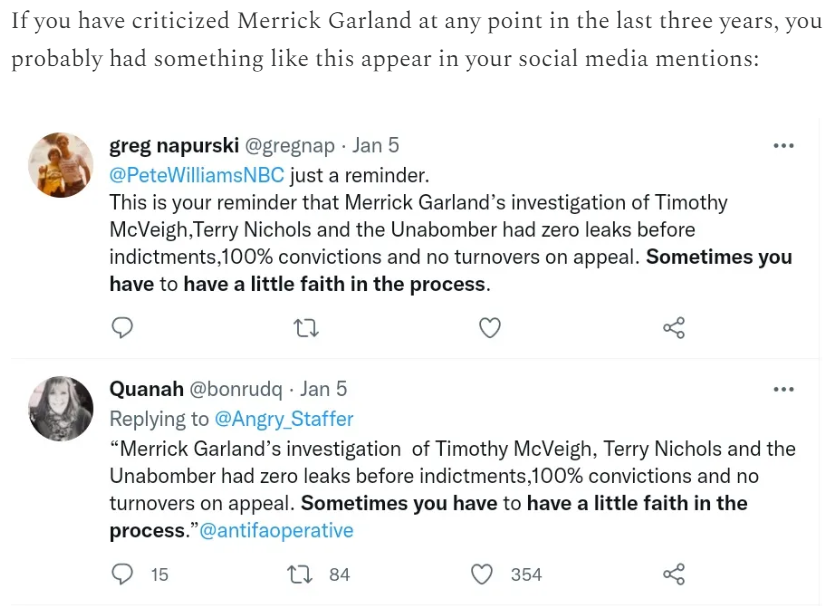Now, after being made aware of some information, I'm not at all sure that timid incompetence was the correct way to view the situation. That assessment was very likely wrong. It definitely was based on incomplete knowledge. That is always a danger.
I have told this story in pieces over the years. I am now putting the information in one article to make it easier to find. The story touches on so many atrocities that it is impossible for me to cover them all, and I encourage folks to pick up where I left off. The point of describing a crisis is to give people tools to fix it. This shadow network affects everyone, regardless of where you live or for whom you voted.It is common to hear Garland described as an institutionalist. This is true. He protects a broken and corrupt institution, the Department of Justice. He protects it instead of protecting the United States or its people. He protects it above democracy or freedom or a future. He protects it over justice itself.
The DOJ Industrial Propaganda Complex that emerges when any critique of Garland is made insists that justice is imminent. They bleat that Garland is merely “dotting the I’s and crossing the T’s”.
Which he is, in the word COMPLICIT.
Garland is not unique in his role as a mafia state enabler. He follows a long line of DOJ cover-up operatives marketed as saviors of American democracy: James Comey, Robert Mueller, Bill Barr, Cy Vance, and so on. Over and over, Americans are told that these prosecutors are going to “get Trump” and dismantle his criminal network. Over and over, they serve their real role, which is to run out the clock and allow criminal elites to escape accountability.
The FBI and DOJ need to protect Trump, because in doing so, they protect themselves.Many fail to understand Garland’s role due to an elaborate propaganda network (the mechanics of which I will break down) and a reluctance to recognize complicity among officials who are often portrayed as feuding. It is easier to attribute disaster to one political party instead of examining networks and recurring figures responsible for a multitude of tragedies over the past twenty-five years.
Jamie Gorelick is one of these figures, a Forrest Gump of 21st century corruption. Like Garland, she is a Democrat who serves GOP objectives, the most notable of which for Garland was working as Ivanka Trump and Jared Kushner’s lawyer and getting them the White House clearances that they should have been denied due to conflicts of interest.
As a result of Gorelick’s actions, Kushner gained classified intelligence that he likely shared with or sold to foreign states, including Saudi Arabia, from which he pocketed two billion dollars, and Israel, to which he has been tied since birth due to his family’s long friendship with the Netanyahu family, to the point that Benjamin Netanyahu slept in Jared’s bed when visiting the United States.Garland has refused to investigate Kushner. A likely reason is that, were he to investigate Kushner – who remains a profound national security threat – he would also be investigating his best friend.
It is one big club, and it is destroying our country.
Crises of institutional integrity are beyond partisanship. They cannot be fixed by elections. They can only begin to be remedied when the rot is revealed. The road to accountability begins with evidence, context, and history.Reckoning with this horror is difficult, but an informed public is a powerful public. Never forget that state officials are paid to serve you. You deserve more than a plate of platitudes meant to weaken your capacity for critical thought.Merrick Garland gained national prominence when he was blocked from the Supreme Court by Republicans in 2016. The refusal of the GOP to hold hearings gave the Americans the false impression that Garland is a staunch Democrat and defender of liberty.
In reality, the GOP refusal had little to do with Garland, but with their desire to pack the court with right-wing extremists once Trump ascended. Garland is not a right-wing extremist. He is a cog who serves corrupt interests under the guise of being “moderate” and “cautious” – stalling investigations and blocking evidence from public view. That is what he did during his brief tenure at the Clinton DOJ from 1994-1997. That is what he does at the Biden DOJ now.GOP extremists have long praised Garland. In 2017, after Trump fired James Comey, Mitch McConnell suggested that Garland become the FBI director.
“I have spoken with the president about it. I recommended Merrick Garland,” McConnell said in May 2017. He recited the propaganda line that Garland “was the prosecutor in the Oklahoma City bombing case.” (Garland was not. The lead prosecutor in the Oklahoma City bombing case was Joseph Hartzler, and how that lie gets circulated will be explained later.) McConnell added that Garland “would make it clear that President Trump will continue the tradition at the FBI of having an apolitical professional.”
In October 2021, Donald Trump praised Garland as “a good man” and said he was glad Garland was Attorney General. At that point, the DOJ had not even opened an inquiry into the Capitol attack, a dereliction of duty that was obvious to anyone with eyes and ears, but which Garland’s backers staunchly denied until time had run out, and it was too late.
In other words, once Garland and Trump had achieved their goals.
.
.
.
.
There is much more. I am only including highlights because if I were to list every crime she [Jamie Gorelick] abetted, I would have an epic.
It is time to move onto another job for which she remains largely uncredited: Merrick Garland’s chief propagandist.

















